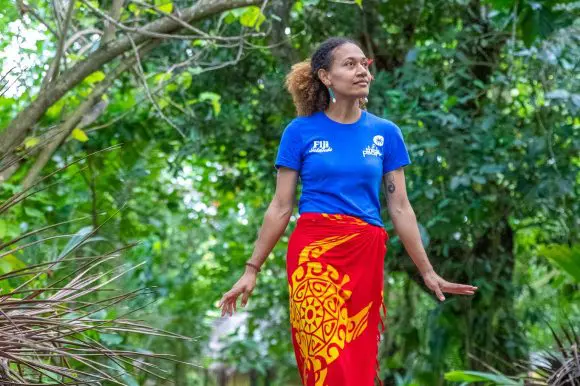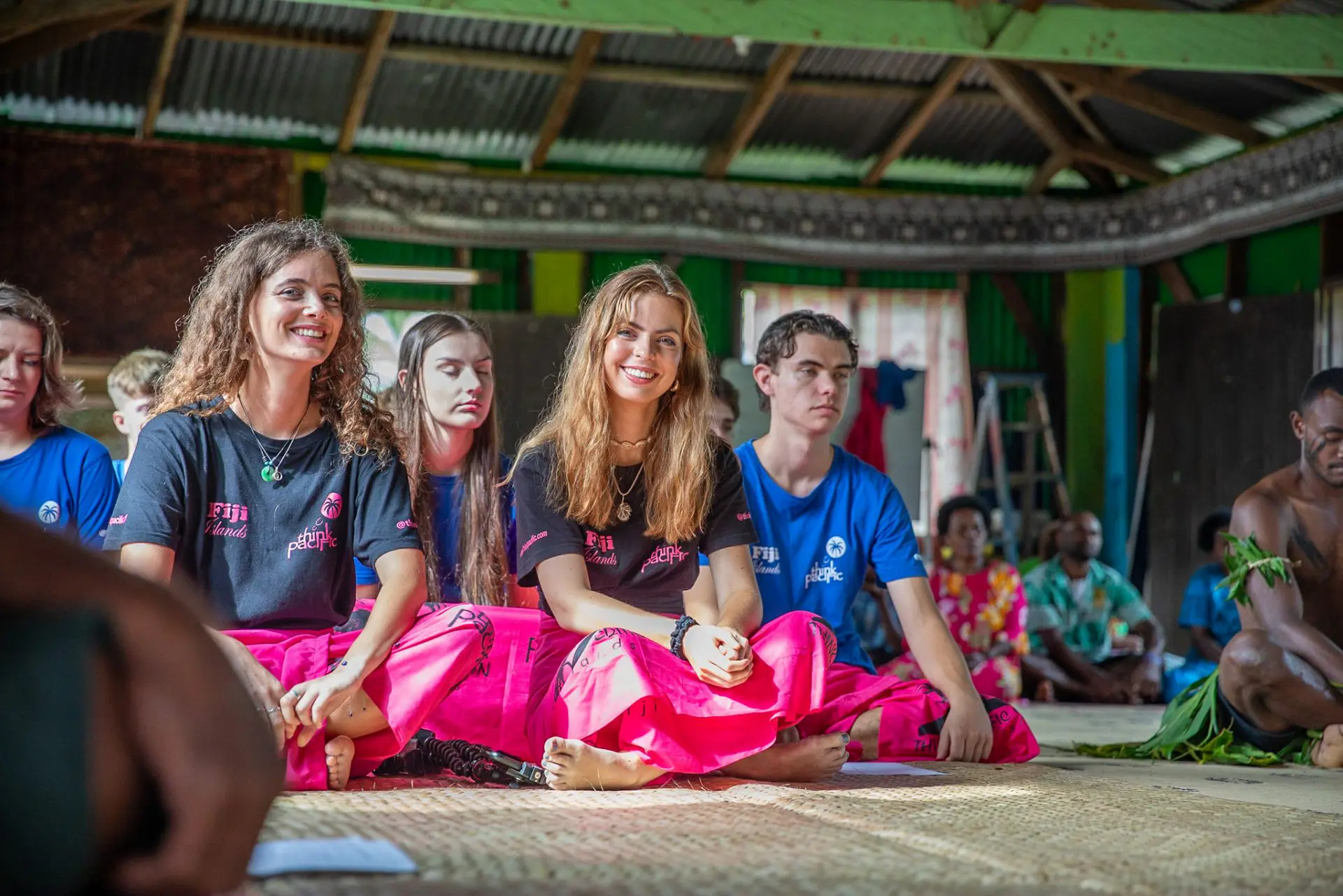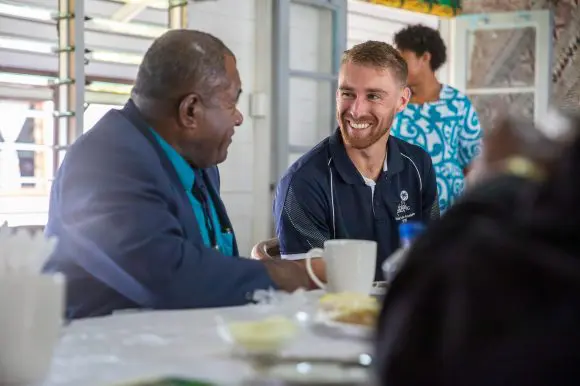By clicking submit, I consent to my personal data being collected, stored, and processed by Think Pacific in accordance with our Privacy Policy.
Our Unique Approach
To anyone who’s had a work-integrated learning experience overseas, there is little doubt of the life-changing impact it can have. Students who join our project often come back with a new sense of self, of their own abilities and strength, and a better understanding of what they find personally fulfilling. However, it is vital that this is achieved through the correct approach!
It is with a learning mindset, long-term thinking and focus on collaboration that we achieve this. Think Pacific is proud to have registered organisations in each destination we work and over 100 annual staff globally. What does this mean for you? That you are joining an organisation that provides an authentic experience like no other, whilst knowing that what you are doing is achieving outcomes that have a sustainable ripple effect.

Fundamental to Think Pacific’s model is that every project is created in collaboration with and at the request of local organisations and communities to ensure everything we do has a real purpose and achieves long-term outcomes. We are respected for working within the framework of the government, adding immediate benefit to existing strategies through projects themselves and continued funding provided year-round. An example of this is driving forward the aims of Fiji’s National Development Plan through our projects across rural villages in Fiji.
Whether it be a mental health project in a rural community in Fiji or a team internship in Bali or Thailand, it’s important you know that rather than imposing our own ideals, the projects themselves and your participation are designed to support localised objectives whilst giving you an experience that whilst change your perspectives and increase your career opportunities.




Is it an Internship, a Placement, Volunteering, or Experiential Learning?
Our projects can be viewed as different things but it’s important you know what they mean to us. We expose students to different ideas, beliefs, cultures and challenges that can broaden minds, expand cultural intelligence and develop soft skills. Reflection is always central which means experiential learning is therefore intrinsic to our core beliefs.
The depth of our partners, such as Ministry Departments, means our projects are often seen as ‘work placements’, ‘work integrated learning’, ‘credit based modules’ or an ‘internship’, as you work collaboratively and learn applicable career skills or apply theoretical knowledge in supporting specific areas of development at a community level.
Regardless of which type of program you join – there is a huge amount of personal and professional development to be had, providing that you bring the correct mindset and adopt the Think Pacific values of collaboration, humility and passion.

No Superheroes, No Saviours. Just Thoughtful Collaboration, Challenge and Understanding.
You won’t change the world on a TP project. But with us, you will be able to make a small and real contribution. Sustainable development is complex. International exchange organisations can be a real mixed bag of quality. If you’re reading this far, then we know you’re someone who likes to delve deeper and consider carefully – which is wonderful!
You join a project for a short period of time, but with Think Pacific your impact is part of a long-term plan, which achieves sustainable initiatives. In other words, you become a chess piece in a much bigger game of chess! Our projects are rewarding and positive for local partners and communities and continue to achieve empowering results. To progress our impact further, we’re looking for individuals who really want to learn, embrace a new way of life and test themselves in unfamiliar settings. If you join a team with this mindset and a positive ‘can do’ attitude, we promise, you’ll work on genuinely sound initiatives, which are making a real contribution at a local level.
Each programme breeds global understanding and is demanding but carefully designed to match your skill level. We know our project is a real challenge, but living in a different culture is just about the biggest, most reflective and most memorable life lesson you can have.

Our Global Team Internship (GTI) is the opportunity for life-enhancing work experience, which invests strategically in the wider aims, vision and potential of local businesses and organisations, whilst the experience itself invests in your skillset and global experience. it’s a win/win situation for all involved. We craft programmes with inspiring local partners, which challenge your perspectives, increase your confidence, create meaningful connections and help you gain a better understanding of the world, of different cultures, of different perspectives and of what inspires you, through active and impactful contribution.
Through working on carefully considered projects with our hand-picked network of local social enterprises and charities, you will leave your comfort zone and ultimately, consider practical and sustainable solutions to a range of current challenges faced by local organisations. Definitely not your ordinary internship, the ‘GTI’ is as far from a boring office job as you can get! You’ll work with at least 3 different organisations during a diverse and fast paced project.

We engage international participants at the request of local partners and for the following two reasons:
- Local Investment: A central aim of our project is to fund local initiatives. Think Pacific is funded by the project fees of students who joins us and in turn we invest locally in Fiji and Indonesia. Every participant can be very proud that through their project, they financially contribute to the places they visit and the people they meet, which among other initiatives, provides long-term training, job creation and scholarships for local people, as well as investing heavily into the local micro-economy.
- International collaboration: Each project provides the chance for cross cultural dialogue. This fosters a celebration of indigenous culture, an exchange of ideas, a sharing of knowledge, skills and beliefs and in so doing, contributes to a more globally connected and understanding world.

You may have guessed by now that we are very keen to encourage a learning mindset!
This is exactly what we ask of you when joining a Think Pacific project; to be curious and open-minded, arriving with the expectation to challenge your perspectives, adapt to new environments with humility and respect and learn about people and yourself. Part of this process involves un-learning your own perspective and recognising your own biases, and we really believe that this is highlighted when thrown into an unfamiliar environment and when met with people who come from very different backgrounds and cultures
During your program, you are part of the collaborative process that is a Think Pacific project – equitable, professional, respectful, mutually beneficial. This provides the setting for a healthy cultural exchange, an open learning environment for all involved and the right platform to succeed.
To this aim, we ask international students to view our projects as a global classroom in which they are participating with like-minded peers and to be proud that they have contributed financially to local community development.
If we may not exactly fit a volunteering stereotype, then what could we be? Are we experiential learning? Service learning? Are we work-integrated learning or an internship?
We view our projects as an amalgamation of all of the above.
Depending on the nature of the project aims we’re asked to collaborate with, different Think Pacific projects may steer closer to one of the above terminologies. What is consistent is that all our projects focus on cultural immersion, learning from local people and significant reflection for the student.
We expose students to different ideas, beliefs, cultures and challenges that can broaden minds, expand cultural intelligence and develop soft skills. Reflection is always central and Experiential Learning is therefore intrinsic to our core values. The depth of project partners such as the Fijian Ministry Departments and influential local NGOs, means our projects are often seen as ‘work placements’, ‘work integrated learning’, ‘credit based modules’ or an ‘internship’, as students work collaboratively and learn applicable career skills or apply theoretical knowledge in supporting specific areas of local plans at a community level. We bolster this by employing lecturers from universities, guest speakers from local NGOs or NSOs, and professionals from the medical and health sectors as well as our government partners to engage within our direct delivery.
The nature of projects being short-term means we can sometimes be referred to as voluntourism. Although we do not view that our projects contain the negative associations the term has come to represent.
Voluntourism has been defined as the act or practice of doing volunteer work as needed in the community where one is vacationing (Merriam-Webster) or by the Cambridge Dictionary as a type of holiday in which you work as a volunteer.
Whilst Think Pacific does involve a (our) version of volunteering, and our projects are unquestionably a form of tourism, we deter from promoting Think Pacific as a holiday.
From a Fijian perspective at least, the name Think Pacific is best known as a Fijian charity. A locally registered not-for-profit organisation with over 50 + local staff and Fijian university interns employed annually, led by Fijian Trustees, collaborating with a network of other local Fijian organisations, bodies and ministries. In this context, our ‘international volunteer projects’ are just one small component in the bigger picture of what our foundation has grown to represent for rural communities. A foundation, which acts year-round, in a country, where our staff are permanent residents.
Think Pacific Foundation (FIJI) is known locally for funding community development programs, delivering workshops, and skills training, ‘educate the educator’ programs, running sports and youth development courses, funding youth conferences at regional and national levels and collaborating with local businesses, universities, government and NGO’s on a range of health promotion, sports development and community development initiatives. We are also known for providing donations and grants to grassroots community groups, schools, early years education centres and youth groups to achieve projects that would not be funded by other means.
Take one our core project in Fiji as an example of local programme design…
These projects have been designed with the Fijian Ministry of Youth and Sports and The Fijian Ministry of Health. It involves students living and working within remote, traditional and subsistence Fijian communities, usually for a time frame of 1 month. We work predominantly with Fijian Youth Groups, which are made up of local Fijian men and women aged 18-35.
During the project, the international students and Fijian youths (and wider community members if they wish to partake) discuss, share, debate and work together to achieve learning outcomes and small-scale actionables. The aim is for ‘volunteers’ and Fijian Youths and community members to discuss different topics and learn from each other.
Depending on the project and needs and wishes of the local stakeholders we work on a mix of thematic areas, or focus more specifically on one area of public health, mental health promotion, life skills & leadership, sports development, environment, enterprise or engineering and built environment.
Through daily workshops, action projects, cultural and group activities we aim for the following outcomes in each program:
● International students learn about Fijian culture, customs, traditions, history, community and subsistence village life and gain an understanding and appreciation of local and national issues. Students learn from Fijian youths, local leaders, community health professionals, local educators, women’s groups and elders.
● Both international students and Fijian youths discuss and learn about thematic areas decided by the community and ministry, such as public health promotion, mental health, sports development, life skills and leadership, environmental issues and micro-enterprises or the built environment.
● Both international students and Fijian youths gain a global perspective and an international experience.
● Both international students and Fijian youths learn about their cultural differences and similarities.
● Both international students and Fijian youths learn about global issues in a Fijian and Western context.
● Both international students and Fijian youths pass their skills to younger generations by leading sports, extracurricular and advocacy through structured games and activities within village settings.
● Both international students and Fijian youths further their skills in personal development, time management, communication, reasoning, leadership, teamwork skills and reflection.
● Fijian youths further their employability, learn about local training and education opportunities, become local ambassadors for the Fiji National Development Plan and continue advocacy with their peers and younger generations within rural areas of Fiji.
We describe our project participants as ‘volunteers’ but the term may not always be the best fit. At least in a traditional sense of what Westerners may associate with ‘volunteering abroad’. Our participants do support locally-led initiatives alongside local people and we do live within traditional and communities. However;
● Our volunteers do not deliver projects primarily to ‘serve’.
● Our volunteers do not work with people who are suffering humanitarian crises
● Our volunteers do not work with communities who are ‘desperate’, require ‘help’ from an outsider, or live in ‘poverty’.
● Our volunteers do not work in career roles, which could replace or take away jobs from local people, although we do often shadow, collaborate with and learn from talented local professionals in these sectors.
● The act of ‘volunteers alleviating the poor’ was not a driver for our inception or in anyway tied to our vision for the future.
● Our ‘volunteers’ only work in the same capacity as they may do so within their home countries, such as sports placement students assisting with after school clubs for youth, or health students undertaking a work placement under supervision.
The above are common media connotations of ‘volunteering abroad’ and also the makeup of many criticised programs, where unqualified volunteers/ voluntourists may partake in areas outside of their skill level, qualification and appropriateness.
Think Pacific projects are primarily a learning endeavour for the student, a cultural exchange which adds value to the local economy, and fosters appreciation, understanding, equality and respect. Secondly, our volunteers make small contributions to existing local initiatives, guided by local people in a structure of collaboration.
Think Pacific does ‘make a difference’, but the positive outcomes are small in scale, come predominantly from the bigger picture of local capacity building and are reciprocal to all.







